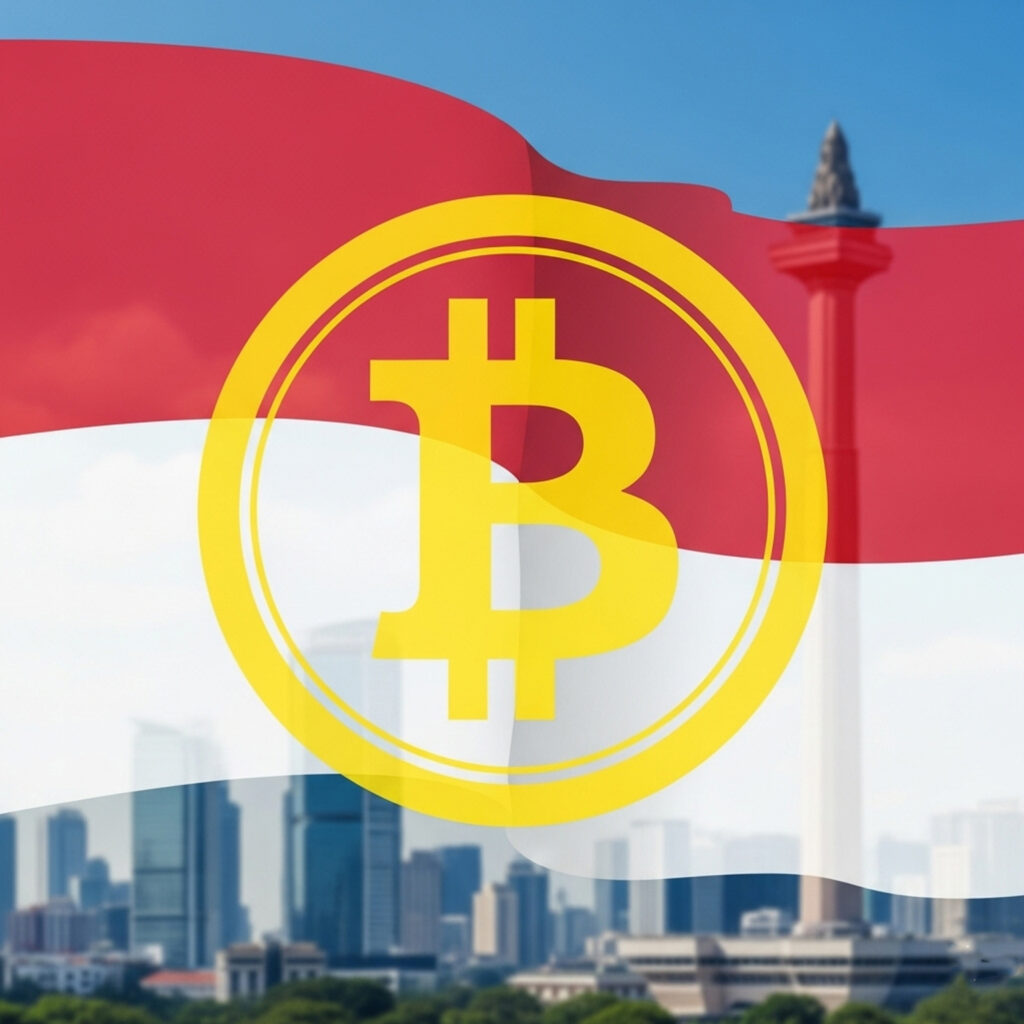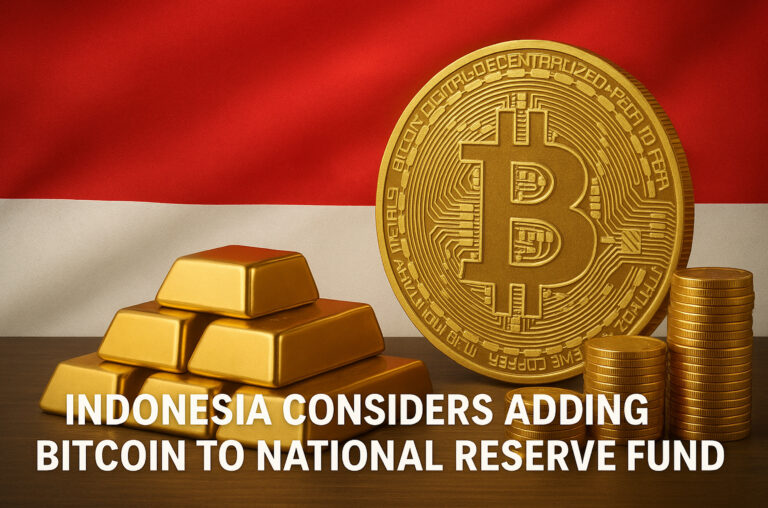Premium Biz Post – In a surprising move that has captured global attention, Indonesia considers adding Bitcoin to national reserve fund management through a state-controlled institution. The plan, reportedly involving an allocation of around USD 18.3 billion, would mark a historic shift in how one of Southeast Asia’s largest economies approaches digital assets. This proposal highlights the government’s ambition to diversify its financial portfolio while also preparing for the digital economy’s growing role in the global financial system.

Background: Why Bitcoin is on the Table
For years, Indonesia has relied heavily on traditional assets such as foreign currencies, government bonds, and gold to maintain economic stability. These reserves provide a financial buffer against global market volatility, helping the country stabilize its currency and finance imports during crises. However, the shifting global landscape and increasing adoption of cryptocurrencies have led policymakers to explore new options.
Bitcoin, known as the world’s first and most valuable cryptocurrency, has gained acceptance as a digital store of value across multiple nations and institutions. While some countries, like El Salvador, have already declared Bitcoin as legal tender, others remain cautious. Indonesia’s latest discussion signals a middle ground — not necessarily adopting Bitcoin as currency but recognizing its potential as a reserve asset.
The Role of BPI Danantara
According to reports, the management of the proposed Bitcoin reserves would be handled by BPI Danantara, an institution tasked with overseeing state wealth and investment strategies. This organization is expected to ensure transparency, accountability, and risk management, which are critical factors when dealing with a volatile asset like Bitcoin.
Financial experts note that BPI Danantara’s involvement is essential to reassure both domestic and international observers that Indonesia will not plunge recklessly into the crypto market. Instead, the approach appears carefully structured, focusing on diversification rather than wholesale adoption.
USD 18.3 Billion Allocation: A Significant Commitment
The suggested allocation of USD 18.3 billion is not a symbolic gesture. It represents a substantial portion of Indonesia’s reserve management strategy. By comparison, this amount would place Indonesia among the top government holders of Bitcoin worldwide if fully implemented.
Analysts suggest that this commitment reflects not only optimism about Bitcoin’s long-term value but also a recognition of global trends. As central banks and investment funds explore blockchain-based assets, Indonesia’s decision could enhance its reputation as a forward-looking economy.
Supporters’ Perspective: Diversification and Future Growth
Supporters of the proposal argue that adding Bitcoin offers Indonesia several advantages:
- Diversification of Assets – By not relying solely on traditional reserves like U.S. dollars and gold, Indonesia reduces exposure to fluctuations in global fiat markets.
- Hedge Against Inflation – Bitcoin is often promoted as “digital gold” because its supply is limited to 21 million units, potentially protecting against long-term inflation.
- Technological Image – Incorporating Bitcoin would reinforce Indonesia’s image as an emerging leader in digital innovation, strengthening its digital economy agenda.
- Attracting Investors – A bold move like this could attract global investors interested in Indonesia’s forward-thinking strategies.
Read More : ”Cute Printable Crafts: Creative Fun for Everyone”
Critics’ Concerns: Volatility and Risk
Despite the excitement, critics warn of several challenges:
- Price Volatility: Bitcoin is notorious for rapid price swings, which could expose Indonesia’s reserves to unexpected risks.
- Regulatory Uncertainty: Global regulations around cryptocurrency are still evolving. A sudden shift in international policy could affect the value and liquidity of Bitcoin holdings.
- Public Perception: Citizens may question whether allocating billions of dollars into such a volatile asset is prudent, especially if other sectors like healthcare or infrastructure require urgent funding.
- Cybersecurity Risks: Managing Bitcoin requires advanced digital security measures to prevent hacking, theft, or mismanagement.
The Global Context
If Indonesia proceeds, it will join a small but growing list of countries exploring digital assets in their national reserves. El Salvador is the most prominent example, though its experiment has faced mixed results. Meanwhile, countries like the United States and Germany indirectly hold Bitcoin through asset seizures and auctions.
What sets Indonesia apart is the scale of the proposed allocation and the structured approach involving a dedicated institution. Rather than adopting Bitcoin as currency, Indonesia’s plan emphasizes using it as a reserve diversification tool. This distinction could make the model more palatable to international financial organizations such as the International Monetary Fund (IMF).
Implications for the Digital Economy
Indonesia is already experiencing rapid digital transformation, with its digital economy projected to reach over USD 109 billion in 2025. Incorporating Bitcoin into state reserves aligns with this trajectory, signaling the government’s recognition of blockchain technology’s role in shaping future markets.
Such a move could also encourage local startups, fintech platforms, and blockchain innovators to expand operations in Indonesia. It might also accelerate educational initiatives to build digital literacy and trust in blockchain systems among citizens.
Regional Impact in Southeast Asia
Indonesia’s neighbors will be watching closely. If successful, this policy could inspire other ASEAN nations to reconsider their positions on digital assets. Countries like Singapore and Malaysia have already developed advanced regulatory frameworks for cryptocurrencies, but none have integrated Bitcoin into national reserves. Indonesia’s potential leadership in this space may shift the region’s competitive landscape.
Economic Stimulus and Investor Confidence
In parallel with the Bitcoin reserve discussion, Indonesia has announced a nearly USD 1 billion economic stimulus package aimed at strengthening domestic industries, supporting small businesses, and boosting post-pandemic recovery. Linking both initiatives could demonstrate Indonesia’s dual strategy: stabilizing short-term growth while preparing for long-term digital transformation.
Investor reactions are mixed but attentive. Global markets often respond to bold financial strategies with heightened interest. If managed transparently, Indonesia’s move could draw international capital inflows and boost confidence in its economic management.
Future Scenarios
- Successful Integration: If Bitcoin prices stabilize or grow, Indonesia could gain significant financial strength while inspiring other nations.
- Moderate Gains with Risks: Even if volatility persists, strategic management might still bring diversification benefits.
- Negative Outcome: A sharp downturn in Bitcoin value could raise domestic criticism and pressure the government to reconsider its decision.
Each scenario will depend heavily on how effectively BPI Danantara manages the reserves, ensuring accountability and protecting national interests.
Indonesia’s consideration of adding Bitcoin to its national reserve fund is a landmark development in the evolving relationship between governments and digital assets. While the move carries undeniable risks, it also signals confidence in the future of blockchain technology and the digital economy.
Whether or not this proposal becomes reality, the discussion itself highlights a new era for Indonesia’s economic strategy. By balancing ambition with caution, the nation may pave the way for a more diversified and digitally integrated financial future.



